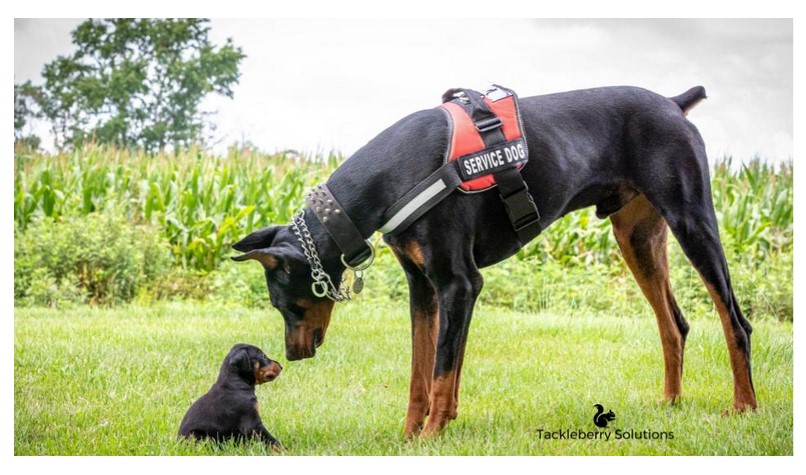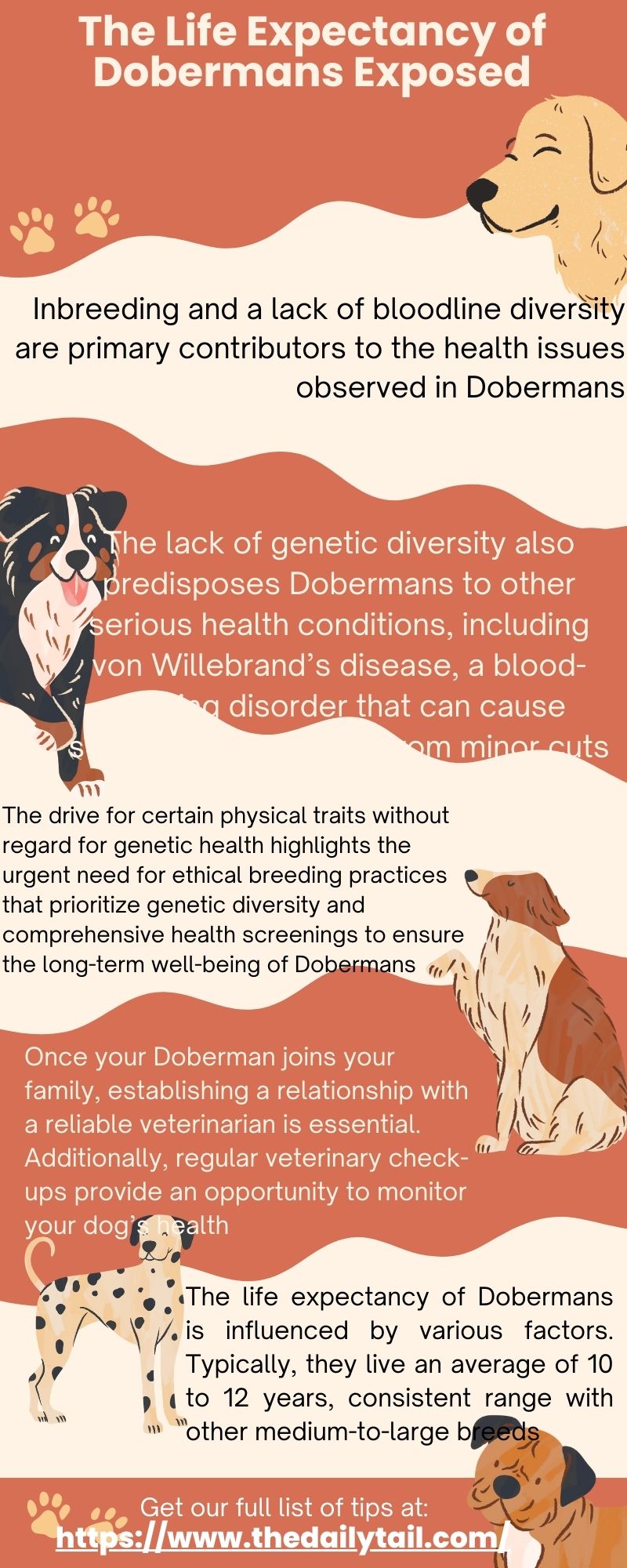Above all, the life expectancy of Dobermans are certainly not something to joke about. Specifically if you’re considering the addition of one of these amazing canines into your life. Likewise, there is nothing more painful in this world than unexpectedly losing the beloved companionship of a loved one.
What’s worse, watching your fur baby fade away and die far earlier than the full and thriving life that you had hoped they could have enjoyed in place of a premature death.
In all honesty, the fact that no dog has been able to match the average length of mankind is a brutal truth.
Understanding The Life Expectancy of Dobermans
Primarily, Doberman Pinschers are known for their intelligence, athleticism, and loyalty. However, like many breeds, the life expectancy of Dobermans is influenced by various factors. Typically, they live an average of 10 to 12 years. While this range is consistent with other medium-to-large breeds, it can be affected by genetic health conditions that are prevalent in the breed.
Notwithstanding, advancements in veterinary medicine and responsible breeding have made it possible to mitigate some of the genetic health risks that Dobermans face.
For instance, supporting breeders who focus on quality over quantity and commence responsibly can significantly reduce the likelihood of an early death. Certainly, in stark contrast to scam breeders who care nothing for the health of their dogs and are solely focused on personal gain.
Factors Contributing to Early Deaths
The life expectancy of Dobermans: Inbreeding and a lack of bloodline diversity are primary contributors to the health issues observed in Dobermans. To explain, inbreeding (or line breeding), while sometimes used to reinforce desired traits, significantly reduces genetic diversity, leading to a higher likelihood of hereditary disorders. According to studies in veterinary genetics, this reduced gene pool heightens the risk of conditions such as dilated cardiomyopathy (DCM), an often-fatal heart disease prevalent in Dobermans.
Likewise, the lack of genetic diversity also predisposes Dobermans to other serious health conditions, including von Willebrand’s disease, a blood-clotting disorder that can cause severe bleeding even from minor cuts. This is corroborated by research from the American Kennel Club (AKC), which emphasizes that both genetic testing and maintaining diverse bloodlines are crucial in preventing such disorders and can directly impact the life expectancy of Dobermans.
In addition, Dobermans can suffer from hip dysplasia, a condition resulting from poor skeletal development that leads to chronic pain and reduced mobility. According to a report from the Orthopedic Foundation for Animals, this condition is often inherited and can be mitigated through responsible breeding practices.
Furthermore, the narrow focus on aesthetics, such as specific coat colors or body structures, further exacerbates these issues. To explain, this pursuit of visual appeal often overshadows the importance of health, leading to a perpetuation of genetic vulnerabilities. Veterinary sources, including the Journal of the American Veterinary Medical Association, highlight that prioritizing appearance over genetic health contributes significantly to the breed’s susceptibility to early death and chronic illnesses.
Thus, the drive for certain physical traits without regard for genetic health highlights the urgent need for ethical breeding practices that prioritize genetic diversity and comprehensive health screenings to ensure the long-term well-being of Dobermans. In conjunction, proper education and adherence to ethical breeding standards are imperative to improving the life expectancy of Dobermans.
Steps to Ensure a Long and Healthy Life
Marketly, providing your Doberman with the best chance at a long and vibrant life starts with careful planning and ongoing care. To expound, one of the most impactful decisions is selecting a responsible breeder who prioritizes the health of their dogs. Critically, a trustworthy breeder will openly share the bloodline for their breeding pairs, ensuring that their puppies have a reduced risk of inheriting genetic conditions like dilated cardiomyopathy or von Willebrand’s disease. Correspondingly, they will also offer health guarantees, which reflect their commitment to producing healthier generations of Dobermans.
In conjunction, once your Doberman joins your family, establishing a relationship with a reliable veterinarian is essential. Additionally, regular veterinary check-ups provide an opportunity to monitor your dog’s health and catch any potential issues early. Preventive care, such as parasite prevention and food quality, plays a critical role in supporting your dog’s overall well-being.
Moreover, maintaining your Doberman’s physical health goes hand in hand with meeting their dietary and exercise needs. A high-quality, well-balanced diet designed for their size and activity level helps sustain their energy and supports healthy joints, muscles, and organs. With that in mind, avoid overfeeding to prevent obesity, which can lead to further complications such as joint pain or diabetes. It’s always a good idea to consult your veterinarian about the best diet for your specific dog.
Furthermore, Dobermans are a highly active and intelligent breed, thriving when they have plenty of opportunities for physical activity and mental stimulation. Overall, daily exercise not only helps them burn off energy but also strengthens their cardiovascular health and muscles. For example, incorporating games, obedience training, or puzzle toys into their routine can keep their minds sharp and reduce stress.
In summary, by focusing on these key aspects of care, you can help your Doberman enjoy a fulfilling, healthy life while strengthening the incredible bond you share with this loyal and loving breed.
Why Dobermans Are Worth the Investment
Dobermans are truly one of the most remarkable dog breeds, offering an unmatched combination of intelligence, loyalty, and versatility. Their ability to form deep connections with their families is a testament to their affectionate and devoted nature. Whether they’re serving as a reliable guardian or simply lying by your side after a long day, Dobermans have an innate ability to provide both comfort and security.
In fact, one of the most outstanding qualities of Dobermans is their trainability. Indeed, they thrive in structured environments and are quick learners, which makes them suitable for various roles, from family pets to service animals. Likewise, their eagerness to please and their strong work ethic make training not only rewarding but also enjoyable. In truth, this breed excels in activities like obedience, agility, and even therapy work, showcasing their incredible adaptability.
For active individuals or families, Dobermans bring endless energy and enthusiasm to outdoor activities. Whether it’s a run in the park, a hike on a trail, or a game of fetch, they are the perfect partner for staying active and engaged. At the same time, their intuitive nature allows them to seamlessly switch from being playful companions to calm and gentle housemates when it’s time to relax.
Owning a Doberman is a commitment, but it’s one that comes with immeasurable rewards. Chiefly, their presence is uplifting, and their unique ability to sense and respond to emotions brings a special kind of companionship. Likewise, the effort put into their care and well-being is returned tenfold in the form of unwavering loyalty and love.
While concerns about the life expectancy of Dobermans may give some pause, it’s important to focus on the joy and enrichment they bring during their years with you. Undoubtedly, with proper care and attention, a Doberman can live a fulfilling life, becoming an irreplaceable part of your family. Accordingly, choosing to welcome a Doberman into your home is not just an investment in a pet—it’s an investment in a lifelong bond that will leave an unforgettable mark on your heart.











